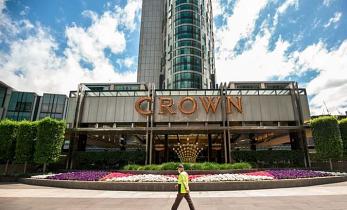Crown's Sydney casino is at risk, but is it worth keeping?
On Monday this week Sydney witnessed the opening of what might be the 21st Century approximation of Slim Dusty's famous pub with no beer: James Packer's casino with no gambling.
Restaurants, bars and the "six-star" hotel opened their doors at Crown Resorts' new $2.2 billion complex in Barangaroo for the first time, but with none of the pomp or fanfare imagined when the 275-metre tower was first proposed eight years ago.
And not just because of COVID-19. The high-roller gaming rooms that underpinned the project's viability remain firmly shut, with serious questions about if and when they will open.
The NSW gambling regulator blocked the $6.5 billion ASX-listed giant from commencing gaming operations in December after its failures to prevent money laundering at its Melbourne and Perth casinos and other probity issues were revealed during a public inquiry into the group.
Crown's casino licence now hinges on former Supreme Court judge Patricia Bergin's findings from the year-long investigation into the group, which was triggered by a series of reports by this masthead. The recommendations are due by February 1.
Crown could lose the licence completely, or have strict conditions imposed. Changes to Crown's management and board could be required, and Packer may have to sell down some of his 36 per cent holding in Crown to lessen what counsel assisting the inquiry called his "deleterious" influence.
But even if Crown keeps its licence, there are questions about whether Crown Sydney is viable in its current form or if the city's tallest building could become a white elephant.
The risk, according to gaming industry experts, is that even after Australia's international borders reopen the Chinese high rollers that were a vital part of the Barangaroo business plan are unlikely to return.
"The international VIP market is pretty much gone," says David Green, an industry consultant who has worked with both casinos and gambling regulators.
"These people won’t put their heads up again while the mainland [Chinese] authorities are as belligerent and antagonistic towards gaming as they now are."
When Packer first proposed the project in 2018, he made it clear having a high-roller, members-only casino attached was crucial to its viability and that China was the biggest opportunity.
Crown promised the NSW government that Barangaroo would deliver $1 billion in tax revenue in the first 15 years of operation. The casino would triple the value of international VIP gaming business coming into Sydney, Packer claimed. But in October, while giving evidence to the Bergin inquiry, he conceded that would never eventuate.
"Clearly that’s wrong but that’s what I believed at the time," Packer told the Independent Liquor and Gaming Authority (ILGA) inquiry.
The billionaire businessman explained that in the original business case international high rollers would generate a third of Crown Sydney's earnings, with local gamblers and its hotel and hospitality operations making up the balance covering the cost of construction.
"The upside in Crown Sydney was from the international VIP business," Packer said.
Out of the $2.2 billion construction cost, Crown also hopes to recoup $800 million from sales of luxury apartments in the tower. The penthouse is still for sale at a reported asking price of $100 million.
Crown's grip on the China market was already slipping, following the arrest of 19 Crown employees in China in 2016 for illegally promoting gambling (one of the main focuses of the Bergin inquiry) and Crown's subsequent exit from its Asian joint venture.
Crown then relied on "junket" tour partners to bring Chinese VIPs to Australia, but that has been put on ice after the Herald and The Age exposed how many of its junkets had links to organised crime, which was examined further at the Bergin inquiry.
Crown has pledged to never work with junkets again, unless state regulators implement a licensing regime for the controversial operators. And just last week the Chinese government passed even harsher criminal penalties for anyone organising Chinese citizens to travel overseas to gamble.
Casino industry expert Ben Lee, from the consultancy IGamiX Management & Consulting, says this effectively closed-off the flow of Chinese high rollers to casinos like Crown Sydney.
“It leaves them up the creek without a paddle," he says. "The only way they even can try to recover their investment [from Barangaroo] is to go aggressively after the local market.”
That will include targeting lower-tier players – not just wealthy VIPs – who currently frequent Crown's Sydney rival The Star, says Lee. That's possible because its table game-betting limit is only $25, which far from being "high-roller" stakes is what most patrons bet on the main gaming floor at Crown Melbourne.
“When you look at the table limit of $25, that’s a laugh," he says. "That’s not even the main hall limit in Macau. So while they were saying one thing, they were really aiming for something else."
Green says that Crown could still attract some relative high rollers. But the inability to extend credit to Chinese gamblers here and get around China's tight capital controls – which was a key function of junkets – would limit the earning potential.
"It’s going to be a lot harder for them to carve much out of gaming itself," Green says.
Green thinks Crown will eventually be allowed to operate in Sydney but may face a long delay in opening the facility and stricter reporting conditions. There may also be some issues replacing its board.




